Automatic Water Boiler Company
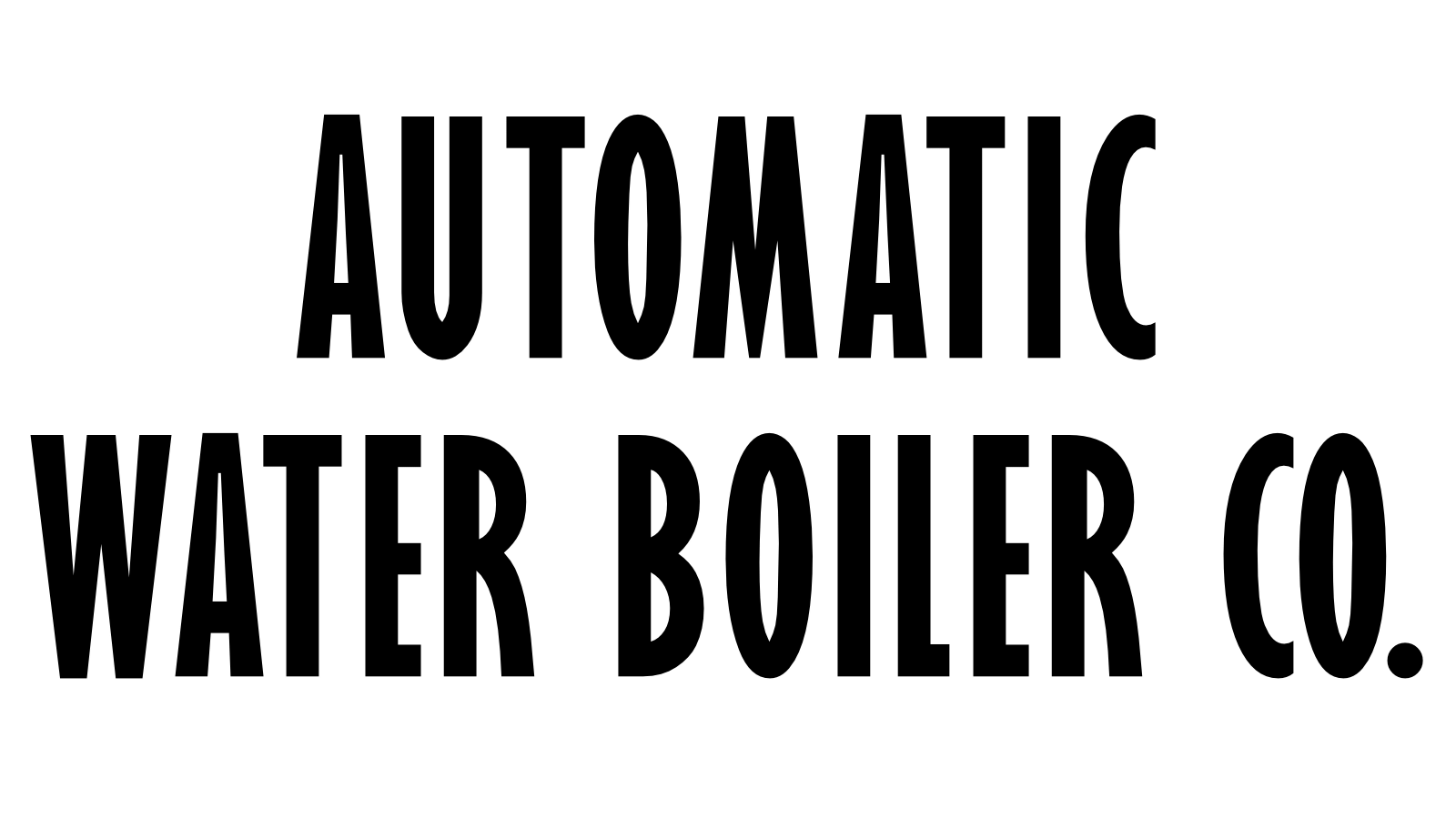
The Automatic Water Boiler Company appear to have been the first company to commercially market a teasmade. The Automatic Water Boiler Company was headed by gun maker Frank Clarke. It seems Frank’s living was made as a marketing guru in the Gadget Shop of his day!
Having acquired the original machine and all rights to it from Albert Edward Richardson for an undisclosed sum, Clarke filed the patent on 7th April 1902 calling it by the catchy title “An Apparatus Whereby a Cup of Tea or Coffee is Automatically Made”. (Patent number 15170). He filed an additional patent US740234A for a time controlling mechanism on 24th July 1903.
This delightful advertisement comes from “Madame” magazine in 1904.
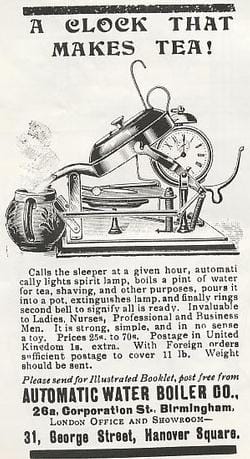
Presumably he marketed the teamaker to the rich clients of his gun establishment in Snow Hill. I imagine that another of his patents, for a trouser press, was purchased and developed in the same way.
Chris Upton writes: “I hereby nominate Frank Clarke (posthumously) for the Nobel Peace Prize: the gunmaker who encouraged people to stay in bed and make tea, not war.”
I have attempted to identify Frank Clarke In the 1881 Census, and only one likely candidate has come to light. The Clarke family of 130 Victoria Road, Aston, Warwick, B6 5HH, consisted of:
James Clarke, a Rifle Sight Maker, age 48, born in London, Middlesex
His wife, Caroline Clarke, age 41. Caroline was born in Birmingham, and married James in London.
Their children, all unmarried in 1886, and all born in Birmingham:
Frederick James Clarke, age 20, Gunfinisher Apprentice
Caroline S. Clarke, age 18
Charles A. Clarke, age 16, Jewellers Apprentice
William Henry Clarke, age 14, Scholar
Gertrude M. Clarke, age 12, Scholar
Frank R. Clarke, age 10, Scholar (likely birth date 1871)
There is a strong possibility that this is indeed Frank Clarke’s family.
In the 1892 directory there is a mention of James Clarke, who may well have been Frank’s father, listed as: Clark, James, rifle sight maker, 27½, Whittall St. (There are a number of other businesses at this address). James remains listed at this address for a number of years, but disappears from it some time between 1904 and 1906, when he would have been 66 to 68 years old and understandably ready for retirement. It seems quite likely that young Frank would have followed his father and eldest brother into the gun making trade.
Frank is not listed in the Birmingham Gun Trade Register in his own right before 1901, but his gun manufacturing business first appears in a Birmingham trade directory in 1902, when he was based in Snow Hill.
According to the advertisement in Madame, the company enjoyed London offices at 31 George Street, Hanover Square, and also at 26a Corporation Street, Birmingham. This site has since been redeveloped and the new property is occupied by Beatties department stores.
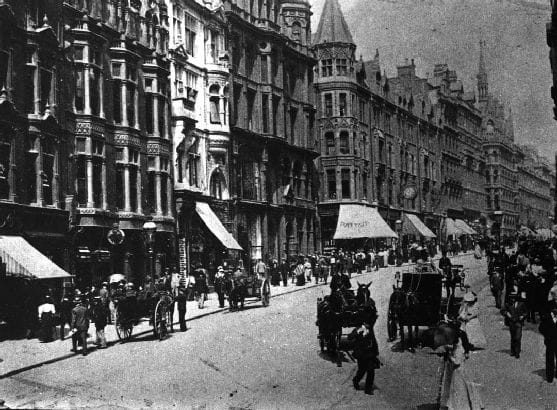
Maria Twist from Birmingham Local Studies Library tells me that there is no mention of the Automatic Water Boiler Company or number 26a Corporation Street in Kelly’s directories for 1903 or 1910. Number 26 is referred to as Midland Chambers. There was an outfitters called Thomas Donne Ltd. at street level, and several different firms in the floors above, including The Wholesale Traders’ Association for the Hardware, Furnishing & Metal Industries Limited, and George A. Heyes & Co., business agents. It is therefore unlikely that the teasmades were actually made in Corporation Street which was, after all, in the middle of the shopping and business district, but that this was an office address.
Although Frank Clarke’ seems to have had no further interest in teasmades after this one, his gun making activities continued into the 1930’s. It appears that he concentrated his efforts on the air weapon trade.
The Birmingham Gun Trade Register confirms that from 1912 to 1919 Frank Clarke operated from 6 Whittall Street, Birmingham. The Birmingham Gun Barrel Proof House records are incomplete before 1912, so there are no details of his earlier gun making activities.
The advert below appears in the Sporting Goods Review, December 1916. This is the only advert known to the Birmingham Gun Barrel Proof House. It shows the Titan Air Pistol, a bolt action pistol. The barrel slides forward allowing the pellet to be loaded from the grip end of the pistol. The piston spring is cocked by depressing a plunger sited in the front of the chamber (muzzle end). The advert also mentions a range of gun pellets made by Frank Clarke, including the Bull Dog, Acme, Leader and King brands.
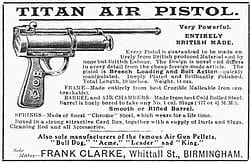
On 17th January 1917 Frank Clarke was granted Patent 110999 for an air pistol. The illustration is an abridgement of the specification.
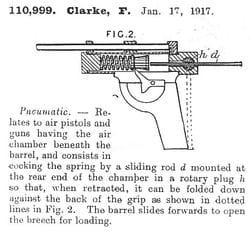
The image below shows a similar design, but with the front cocking lever removed. It is cocked with a rod sited at the grip end, as in the above Patent. This image comes from the July 1979 edition of Guns Review.
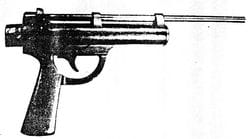
In 1922 Frank Clarke collaborated with JES Lockwood of 3 New Street Birmingham to introduce a new version of the Titan, shown in the image below.
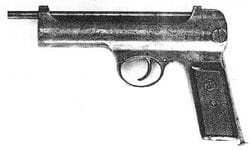
Two further versions were made after this, which differed in how the foresight was fitted and in relation to the flare of the butt. To load these later versions the plunger arm was rotated in line with the cylinder and then depressed until the piston caught on the sear. The rod was then drawn back and folded down alongside the rear of the butt. The breech was now swung at right angles to the line of the butt to allow a pellet to be inserted into the rear of the barrel. Once closed the weapon could be fired. These pistols were not powerful and were designed for use by youngsters.
In 1930 Frank Clarke moved his business to 39 Loveday Street. He collaborated with William Anson on a patent dated July 9th 1930. A family historian, Clare, writes: “I have been researching and writing articles about my Great Great Grandfather William Anson (b.1830) and his son Edwin. As well as having his own gunmaking business in Slaney Street and Steelhouse Lane, William was Manager of the Shotgun action department of Westley Richards and, with John Deeley, invented the Anson and Deeley shotgun action which is still in use to day. Edwin (b. 1863) continued the family business, travelling to the States, and also continuing to invent for shotguns and air pistols.”
Frank’s last entry as a member of the Birmingham Gun Trade appeared in 1939.
